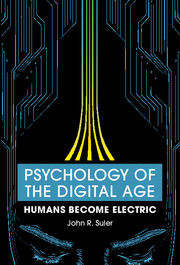Book contents
- Frontmatter
- Dedication
- Contents
- List of Figures
- Foreword
- Preface
- Acknowledgments
- Introduction: Newborns in Evolution
- 1 Cyberpsychology Architecture
- 2 Presence: Be Here Now
- 3 The Dynamic Digital Psyche
- 4 The Disinhibited Self
- 5 Electrified Relationships
- 6 Other Than You Think: Interpersonal Perceptions
- 7 Text Talk
- 8 Image Talk
- 9 I, Avatar
- 10 One of Us: Groups and Communities
- 11 Change and Excess
- 12 Addicted or Devoted
- 13 The Digital Deviant
- 14 Synthesized Realities and Synthesized Beings
- 15 Electric Th erapeutics
- Conclusion: Research and the Researcher
- References
- Index
12 - Addicted or Devoted
Published online by Cambridge University Press: 05 November 2015
- Frontmatter
- Dedication
- Contents
- List of Figures
- Foreword
- Preface
- Acknowledgments
- Introduction: Newborns in Evolution
- 1 Cyberpsychology Architecture
- 2 Presence: Be Here Now
- 3 The Dynamic Digital Psyche
- 4 The Disinhibited Self
- 5 Electrified Relationships
- 6 Other Than You Think: Interpersonal Perceptions
- 7 Text Talk
- 8 Image Talk
- 9 I, Avatar
- 10 One of Us: Groups and Communities
- 11 Change and Excess
- 12 Addicted or Devoted
- 13 The Digital Deviant
- 14 Synthesized Realities and Synthesized Beings
- 15 Electric Th erapeutics
- Conclusion: Research and the Researcher
- References
- Index
Summary
I have with me two gods, persuasion and compulsion.
– ThemistoclesOne day at the Mansion, I found myself in the spa with several other avid Palace members. A curious thing happened whenever we mentioned the word “Palace” in our conversation. For example, when I typed, “What do you people think of Palace?” I was surprised to see what actually appeared on the screen: “What do you people think of this thing that is eating my life?” When I finally figured out that the Palace software itself made this seemingly silly substitution of words, my confusion turned to delight, then curiosity. Indeed, it was an insightful prank by the Palace creator who had built it into the program. It raised an important question, perhaps a worrisome question for many people: is Palace indeed eating my life?
Some people find themselves so captivated by their cyberspace lifestyles that they want to spend as much time there as possible, sometimes to the neglect of their real life. They might not be entirely sure why they find themselves so engrossed. They cannot accurately verbalize an explanation for their compulsion. The humorous substitution of words in the Palace spa suggests that it does feel like an unnamable thing – a compelling, hidden force. It is not the blog, social media, game, shopping, gambling, or whatever online activity that is eating one's life, but the indescribable, unconscious impulse it ignited.
WHAT SHOULD WE CALL IT?
With researchers such as Greenfield (1999), Griffiths (2000), Morahan-Martin (2005), and Young (1998) leading the way, mental health professionals have struggled to find a term to capture this phenomenon accurately. It could be labeled as an Internet addiction disorder, except that people were addicted to their computers before the Internet became popular. We might call the phenomenon a computer addiction or, for those people who compulsively immerse themselves into the imaginary worlds of gaming, a virtual addiction. Video game compulsions were quite obvious even before gaming went into personal computers and then online. To avoid controversies associated with the word “addiction,” some people use expressions like “pathological” or “compulsive” use (Young & Nabuco de Abreu, 2010).
On a broad level, it makes sense to talk about a cyberspace addiction, an addiction to computer-generated experiences. Within this broad category, there are subtypes.
- Type
- Chapter
- Information
- Psychology of the Digital AgeHumans Become Electric, pp. 309 - 326Publisher: Cambridge University PressPrint publication year: 2015



